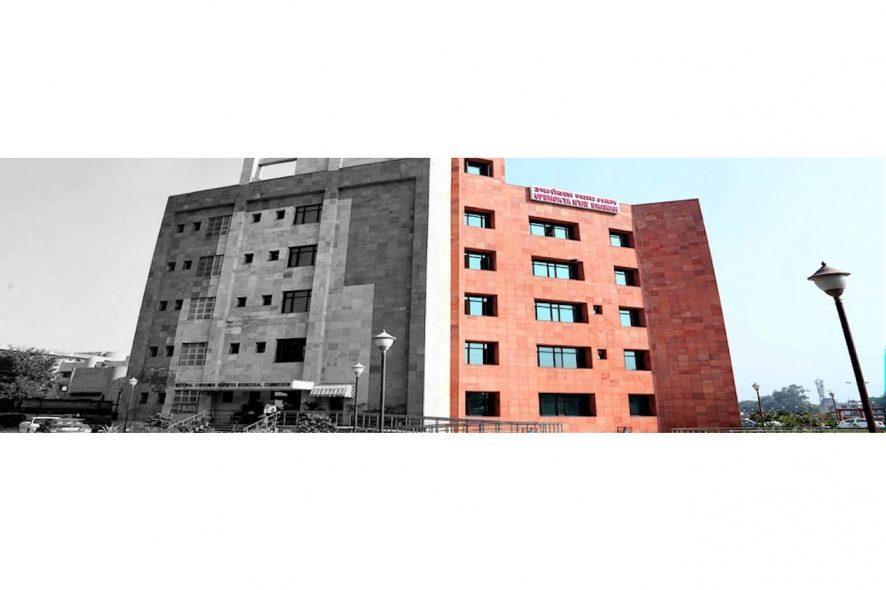National Consumer Disputes Redressal Commission (NCDRC): C. Viswanath (Presiding Member) dismissed the complaint while granting an opportunity to the Complainant to approach any Appropriate Forum/ Authority of Court.
The instant complaint was filed under Section 21 of the Consumer Protection Act, 1986.
Complainant a resident and owner of an apartment at Ambience Island Lagoon Apartment, Gurgaon. OP 1 is the Director of the Opposite Parties 2 and 3.
What is the Complaint?
Complainant submitted that an Apartment Buyers Agreement, dated 20-10-2001 was executed between the Complainant and OP 2 for which he paid an amount of Rs 54, 46, 706 towards the purchase of the apartment.
Further Complainant paid an additional 13% of the sale price in two instalments for the registration of the Deed of the Apartment. In 2003, the complainant received the confirming receipt from OP 2 and in 2014 the Conveyance Deed was also executed.
OPs to date has not executed the Deed of Apartment in favour of the Complainant. Further, they alleged that the Conveyance Deed was forced upon them in lieu of Deed of Apartment.
Adding to the above allegations, another revelation was made that the OPs systematically and intentionally defrauded and misled the Complainant.
Hence, the Complainant alleged deficiency in service.
Analysis and Decision
Bench noted that OPs executed the Conveyance Deed as per clause 13 of the Apartment Buyer Agreement.
Further, adding to the above, Commission stated that there were no one-sided clauses in the Agreement which constituted an unfair trade practice as per Section 2 (r) of the Consumer Protection Act, 1986 and deficiency in service under Section 2 (g) of the Consumer Protection Act, 1986.
In fact, the Complainant sought for the execution of the Conveyance deed before the Delhi High Court in Civil Suit No. C.S.(O.S) No.2155 of 2011.
“…the expressed “terms and conditions” of the ABA are binding on Parties”.
Hence, since Complainant himself filed a Civil Suit in Delhi High Court for the execution of the Conveyance Deed, he cannot back out after it is executed.
Supreme Court’s decision in Bhubaneshwar Development Authority v. Susanta Kumar Mishra, (2009) 4 SCC 684 held:
“Further, any fora under the Consumer Protection Act, 1986 (“the Act”, for short) before granting any relief to a complainant, should be satisfied that the complaint relates to any of the matters specified in Section 2(1)(c) of the Act, and that the complainant has alleged and made out either unfair or restrictive trade practice by a trader, or defects in the goods sold or any deficiency in a service rendered, or charging of excessive price for the goods sold, or offering of any goods hazardous to life and safety without displaying information regarding contents, etc. If none of these is alleged and made out, the complaint will have to be rejected”
In the decision of Satish Kumar Pandey v. Unitech Ltd., Consumer Complaint No. 427 of 2014, it was held that it was an undisputed proposition of law that ordinarily the parties are bound by the terms and conditions of the contract voluntarily agreed by them and it is not for a Consumer Forum to revise the said terms.
Commission observed that Clause 13 of the Agreement clearly stipulated that:
“the Company along with its Associates/Subsidiary Companies as stated earlier shall prepare and execute along with the Apartment Allottee a conveyance deed to convey the title of the said Apartment in favour of Apartment Allottee…”
Therefore, in the present matter, the Commission cannot grant any relief beyond the Agreement entered between the Parties.
Complaint was dismissed in view of the above terms. [Dr Amitabha Sen v. Raj Singh Gehlot, 2021 SCC OnLine NCDRC 23, decided on 24-02-2021]
Advocates who appeared before the Commission:
For the Complainant: Dr Amitabha Sen (Advocate) Complainant in person with Ms Aditi Pandey Ms Prarthana and Mr Abhinav, Advocates
For the OP: Mr P.K. Agrawal, Advocate with Ms Tanya Sharma and Ms Deepti Gupta, Advocate
Explanation of a few terms used in the above brief:
- Conveyance: An instrument which transfers property from one person to another defined for the purposes of the Conveyancing Act, as including ‘assignment, appointment, lease settlement, and other assurance, and covenant to surrender, made by deed on a sale, mortgage, demise or settlement of any property or on any other dealing with or for any property’. [Whart.]
- Deed: A formal document on paper or parchment duly signed, sealed and delivered. (factum inter partes) needing no actual indentation (Real Property Act, 1845, 8 & 9 Vict. c. 106, s. 5) made between two or more persons in different interests or a deed-poll (charta de unâ parte) made by a single person or by two or more persons having similar interests.
- Agreement: Every promise and every set of promises, forming the consideration for each other, is an agreement, [Section 2(e), Contract Act, 1872 (India)]






